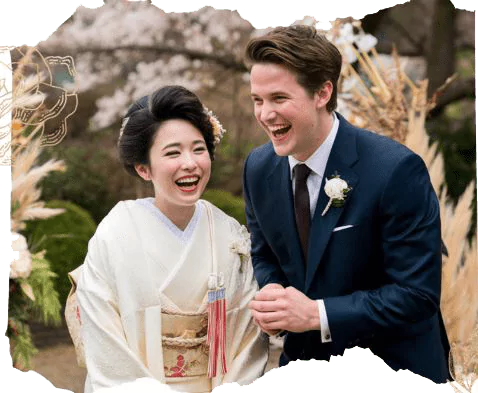
Love knows no borders or frontiers in a globalized world. More and more people find love elsewhere, in diversified cultures across their borders, which can make for lovely and enriching experiences. However, this often entails particular challenges a couple in an international marriage must face to make the marriage flourish.
At Transpacific Marriage Agency, we've experienced joys and troubles since 1994 in joining Japanese women with Western men. We understand that with time, while love might take wings across oceans, it takes more than mere passion to break through the issues that international marriages might commonly face. In this blog, we outline some of the most common top challenges in international marriages and how to overcome them, and practical strategies for dealing with them.

Cultural disparities represent one of the chief problems between people who have entered an international marital union. For example, politeness, tradition, and harmony are deeply ingrained within the tenets of Japanese culture. Still, other cultures not of the East share a preference for individualism and forthrightness in speech. Such disparities often lead to a bottleneck of problematic interactions that are not conducive to a better personal perspective on the part of both parties.
Only education and empathy can help. Couples must spend sufficient time understanding each other's culture and recognizing the values that form the partner's worldview. It can also prevent misunderstandings if each communicates about the expectations of cultural practices. At TMA, we encourage couples to see these differences as opportunities for growth rather than as obstacles.

Language can become a severe barrier to international marriages, especially if one of the partners speaks a different mother tongue. Love does not need effective communication, which is vital for conflict resolution and for sharing motions. Misunderstanding over some time due to language barriers piles up frustration, isolation, and finally, over a time frame, resentment.
Patience and effort are critical. This can enable relations to be bridged by learning and using each other's language up to even more elementary levels. Technology can still be utilized, with couples employing translation apps to assist with communication in daily actions. Moreover, non-verbal communication, such as gestures, expressions, and body language, can supply a lot of emotion by letting emotions flow where words are inadequate. TMA often provides couples with resources to help them learn each other's language, making communicating more accessible and more substantial.
However, international marriages bring many legal and immigration obstacles, from visas and residency permits to the logistics of two countries' legal systems—the process is long, stressful, and expensive. A couple might suffer delays in living together or, worse, have the fear of deportation if not legally arranged from the beginning.
Planning and professional help. Couples should try to learn the immigration laws regarding both countries and not start the process at the last moment. Legal guidance from an immigration lawyer, a professional in international marriage, will ensure all the necessary paperwork is done correctly and will inform the couple about any adversities that could be faced. At Transpacific Marriage Agency (TMA), we guide our clients on the legal steps required for marriage and relocation, helping to ease the burden of bureaucratic obstacles.
Family dynamics in international marriages can sometimes be dicey, as they have diverse expectations about marriage roles, child-rearing, and lifestyle. For example, a Japanese family's traditional values concerning gender roles or family structure will likely go against what modern— or even egalitarian—Western families hold dear.
Lay boundaries and always ensure open communication — though sometimes hard to do. Couples have to remain in one even in their decisions and never be distracted by anything other than the vision they have painted for their family. Always finding two cultures, couples must be a single solid unit to overcome family obstacles. TMA always encourages couples to have some respect in their dialogues with their families, and we often help provide some cultural context if that is the source of misunderstanding.
For many international couples, although the reasons for separation, such as work or other engagement reasons, are acceptable, visa policies or other practical inconveniences often force them to live apart for much of the days and months before marriage. Separation, in whatever regard, is essential, yet it works in a relationship severely and can give rise to loneliness, inferiority, and loss of emotional proximity.
Communication should be firm and regular. A couple must set an ultimate timeline in which they expect to end the separation and strive to achieve it. They need to set up video calls, letters, and other things that make them feel near, thus sustaining the connection. The Transpacific Marriage Agency (TMA) encourages couples to prepare adequately for situations that may lead them to a point of separation and to work on mechanisms to keep them together.
And one of the most stressful life decisions that international couples make is to move abroad. At some point, the one being moved starts feeling like they can't be a part of the foreign culture; even the language, social customs, and sometimes even the climate must be adjusted. As a result, homesickness, isolation, and culture shock arise and, in effect, levy more pressure on the marriage.
Adaptation should come from partners. Spouses who are foreign in a foreign land can get support through the whole adaptation process from their counterparts, who are natives of the land, by giving them emotional support, enabling lifestyle practices, and establishing liaison links with the new environment. Keeping in contact with their culture is vital through organizations and cultural events or even small practices such as preparing meals using their culture's way. TMA often connects our clients to local resources and expat communities to help ease the transition.

Money is one of the most common sources of fighting in any marriage, and international marriages can bring on an added flavour of complexity. Differences in financial expectations, such as spending habits, saving priorities, or attitudes toward debt, can easily lead to tension.
Couples should discuss their financial goals and create a joint money management plan. The key in the program above is transparency because both in the relationship need to communicate freely about their economic status and participate in the budget design, which will address their shared values. At TMA, we emphasize the need for international couples to participate in financial planning to avoid getting blanketed by the high cost of going between two countries.
When an international couple plans to start a family, the question of how to raise bicultural children adds another layer of complication. Differences between partners in disciplines or methods of education, and even sibling-upbringing experiences, as both bring in their traditions and values about the upbringing of children, all these things become visible with time.
Open discussion about parenting styles is essential, after which couples should see eye to eye on one solid approach to be followed consistently across both children. Embracing both cultures can enrich children as they are more likely to see the world from a broader perspective. The anchor between the two can help children feel less threatened by their identities and celebrate both heritages. TMA suggests a few bicultural education and parenting resources for the couple suitable enough to guide them.
International marriages are a blend of love, culture, and growth put together most uniquely. Though they may come with problems, the returns these intercultural relationships give far outweigh the cost one pays for difficulties. With respect, trust, and empathetic hearing, international couples can build a strong marriage that lasts across borders. At Transpacific Marriage Agency, we are proud to have made thousands of international love stories and continue to assist couples in overcoming the challenges of international marriage to facilitate building beautiful lives together.